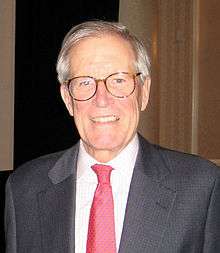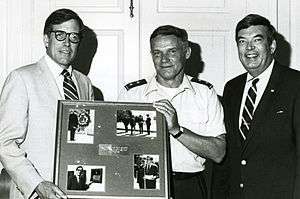Pete du Pont
| Pete du Pont | |
|---|---|
 | |
| 68th Governor of Delaware | |
|
In office January 18, 1977 – January 15, 1985 | |
| Lieutenant |
James D. McGinnis Mike Castle |
| Preceded by | Sherman W. Tribbitt |
| Succeeded by | Mike Castle |
| Member of the U.S. House of Representatives from Delaware's At-large district | |
|
In office January 3, 1971 – January 3, 1977 | |
| Preceded by | Bill Roth |
| Succeeded by | Tom Evans |
| Member of the Delaware House of Representatives | |
|
In office January 14, 1969 – January 3, 1971 | |
| Personal details | |
| Born |
Pierre Samuel du Pont IV January 22, 1935 Wilmington, Delaware, U.S. |
| Political party | Republican |
| Spouse(s) | Elise Ravenel Wood |
| Residence | Wilmington, Delaware and North Haven, Maine |
| Education |
Phillips Exeter Academy Princeton University Harvard Law School |
| Profession | lawyer |
Pierre Samuel "Pete" du Pont IV (born January 22, 1935) is an American lawyer and politician from Rockland, in New Castle County, Delaware, near Wilmington. He was the United States Representative for Delaware from 1971 to 1977 and subsequently served as the 68th Governor of Delaware from 1977 to 1985. He is a member of the Republican Party.
Early life and family
A member of the Du Pont family, du Pont was born in Wilmington, Delaware, the son of Pierre S. du Pont III and Jane Holcomb du Pont, and great nephew of Pierre S. du Pont, the developer of Longwood Gardens. After an education at the Phillips Exeter Academy, Princeton University, and Harvard Law School, he served in the U.S. Naval Reserve (Seabees) from 1957 until 1960. He is married to Elise Ravenel Wood and has four children, Elise, Pierre S. du Pont V, Benjamin Franklin du Pont, and Eleuthère I. du Pont.
Professional and political career
From 1963 until 1970 du Pont was employed by E.I. du Pont de Nemours and Co. In 1968 he was elected to the 1969–70 session of the Delaware House of Representatives. He seriously considered a bid for a United States Senate seat in 1972 (eventually won by Democrat Joseph R. Biden, Jr.), but realized he faced a primary election against former U.S. Representative Harry G. Haskell, Jr. He bowed to the desire of Republican leaders, including President Richard Nixon, to have a reluctant incumbent U.S. Senator J. Caleb Boggs seek a third term.
U.S. House of Representatives
In 1970 du Pont was elected to the U.S. House of Representatives, defeating Democrat John D. Daniello, a New Castle County Councilman and labor leader. He won election to the U.S. House of Representatives two more times, defeating Democrats Norma Handloff in 1972 and University of Delaware professor James R. Soles in 1974. In Congress, du Pont supported an attempt to limit presidential authority through the War Powers Act of 1973, but was one of the last to remain loyal to U.S. President Richard M. Nixon during the impeachment process.
Governor of Delaware
Du Pont did not seek another term in the U.S. House of Representatives as he was elected Governor of Delaware in 1976, defeating incumbent Democratic Governor Sherman W. Tribbitt. He was elected to a second term as Governor in 1980, defeating Democratic State House leader William J. Gordy, and served two terms from January 18, 1977 until January 15, 1985.

Du Pont's two terms as Governor were the major divide in the modern history of the state. Following a desperate initial confrontation with the Democratic Delaware General Assembly over the budget, both du Pont and the Delaware General Assembly developed the consensus approach to decision making that remains characteristic of Delaware politics. As a result of this cooperation, du Pont signed into law two income tax reduction measures and a constitutional amendment that restrained future tax increases and limited government spending. The Wilmington News Journal praised these policies, saying that du Pont "revived [the] business climate and set the stage for [Delaware's] prosperity." In 1979, he founded the nonprofit "Jobs for Delaware Graduates," an employment counseling and job placement program for high school seniors not bound for college. This program was the model for other programs currently functioning in many states and foreign countries.
Du Pont helped establish the credit card industry in Delaware. With the cooperation of the leadership of both parties and many others in state and local government, the Financial Center Development Act was passed, effective June 1, 1981. Intended to attract two New York state banks that would hire at least 1,000 employees, it actually brought over thirty banks to the state and created some 43,000 new finance related jobs. Wilmington and the rest of New Castle County, were completely transformed. Du Pont's action led the state away from its previous dependence on the chemical industry in general and the Du Pont Company, in particular.
| Delaware General Assembly (sessions while Governor) | |||||||||||
|---|---|---|---|---|---|---|---|---|---|---|---|
| Year | Assembly | Senate Majority | President pro tempore |
House Majority | Speaker | ||||||
| 1977–1978 | 129th | Democratic | Richard S. Cordrey | Democratic | Kenneth W. Boulden John P. Ferguson | ||||||
| 1979–1980 | 130th | Democratic | Richard S. Cordrey | Republican | Robert W. Riddagh | ||||||
| 1981–1982 | 131st | Democratic | Richard S. Cordrey | Republican | Charles L. Hebner | ||||||
| 1983–1984 | 132nd | Democratic | Richard S. Cordrey | Democratic | Orlando J. George, Jr. | ||||||
Presidential aspirations
With his term as Governor forced by law to end in 1985, du Pont, as the dominant Delaware politician, was widely expected by many to challenge the incumbent Democratic U.S. Senator Joe Biden. But du Pont had little interest in legislative politics and declined to run, preparing instead for a long shot bid for the Republican U.S. Presidential nomination in the 1988 election. (His wife, Elise, ran for the U.S. Congressional seat that he had previously held in 1984, but lost to incumbent Democrat Tom Carper.)[1] He declared his intent on September 16, 1986, before anyone else. Biden also sought his party's nomination.
Running in the 1988 Republican presidential primaries, du Pont presented an unconventional program. As described by Celia Cohen in her book, Only in Delaware, du Pont, "wanted to reform Social Security by offering recipients private savings options in exchange for a corresponding reduction in government benefits. He proposed phasing out government subsidies for farmers. He said he would wean welfare clients off their benefits and get them into the workforce, even if government had to provide entry level jobs to get them started. He suggested students be subjected to mandatory, random drug tests with those who flunked losing their drivers [sic] licenses."[2] After finishing next to last in the New Hampshire primary, du Pont left the race.[3]
Later career
In 1984 du Pont served as Chairman of the Education Commission of the States, a national organization of educators dedicated to improving all facets of American education. He has also served as Chairman of the Hudson Institute from 1985 until 1987 and the National Review Institute from 1994 until 1997.
Presently, du Pont is the Chairman of the Board for the National Center for Policy Analysis, a think tank based in Dallas, Texas; he is a director with the Wilmington, Delaware law firm of Richards, Layton, and Finger, and until May 2014, he wrote the monthly Outside the Box column for the Wall Street Journal.
| Public Offices | ||||||
|---|---|---|---|---|---|---|
| Office | Type | Location | Began office | Ended office | notes | |
| State Representative | Legislature | Dover | January 14, 1969 | January 3, 1971 | ||
| U.S. Representative | Legislature | Washington | January 3, 1971 | January 3, 1973 | ||
| U.S. Representative | Legislature | Washington | January 3, 1973 | January 3, 1975 | ||
| U.S. Representative | Legislature | Washington | January 3, 1975 | January 3, 1977 | ||
| Governor | Executive | Dover | January 18, 1977 | January 20, 1981 | ||
| Governor | Executive | Dover | January 20, 1981 | January 15, 1985 | ||
| Delaware General Assembly service | ||||||
|---|---|---|---|---|---|---|
| Dates | Assembly | Chamber | Majority | Governor | Committees | District |
| 1969–1970 | 125th | State House | Republican | Russell W. Peterson | New Castle 12th | |
| United States Congressional service | ||||||
|---|---|---|---|---|---|---|
| Dates | Congress | Chamber | Majority | President | Committees | Class/District |
| 1971–1973 | 92nd | U.S. House | Democratic | Richard M. Nixon | at-large | |
| 1973–1975 | 93rd | U.S. House | Democratic | Richard M. Nixon Gerald R. Ford |
at-large | |
| 1975–1977 | 94th | U.S. House | Democratic | Gerald R. Ford | at-large | |
| Election results | ||||||||||||
|---|---|---|---|---|---|---|---|---|---|---|---|---|
| Year | Office | Election | Subject | Party | Votes | % | Opponent | Party | Votes | % | ||
| 1970 | U.S. Representative | General | Pierre S. du Pont, IV | Republican | 86,125 | 54% | John D. Daniello | Democratic | 71,429 | 46% | ||
| 1972 | U.S. Representative | General | Pierre S. du Pont, IV | Republican | 141,237 | 63% | Norma Handloft | Democratic | 83,230 | 37% | ||
| 1974 | U.S. Representative | General | Pierre S. du Pont, IV | Republican | 93,826 | 58% | James S. Soles | Democratic | 63,490 | 40% | ||
| 1976 | Governor | General | Pierre S. du Pont, IV | Republican | 130,531 | 57% | Sherman W. Tribbitt | Democratic | 97,480 | 42% | ||
| 1980 | Governor | General | Pierre S. du Pont, IV | Republican | 159,004 | 71% | William J. Gordy | Democratic | 64,217 | 29% | ||
References
- ↑ Archived February 27, 2015, at the Wayback Machine.
- ↑ Cohen, Celia. Only in Delaware, Politics and Politicians in the First State.
- ↑ "Du Pont drops presidential bid". The Galveston Daily News. Galveston, TX. AP. February 19, 1988. Retrieved October 22, 2016 – via Newspapers.com.

- General
- Boyer, William W. (2000). Governing Delaware. Newark, Delaware: University of Delaware Press. ISBN 1-892142-23-6.
- Cohen, Celia (2002). Only in Delaware, Politics and Politicians in the First State. Newark, Delaware: Grapevine Publishing.
- Hoffecker, Carol E. (2004). Democracy in Delaware. Wilmington, Delaware: Cedar Tree Books. ISBN 1-892142-23-6.
- Martin, Roger A. (1984). History of Delaware Through its Governors. Wilmington, Delaware: McClafferty Press.
- Martin, Roger A. (1995). Memoirs of the Senate. Newark, Delaware: Roger A. Martin.
External links
- Biographical Directory of the Governors of the United States
- Appearances on C-SPAN
- Biographical Directory of the United States Congress
- Delaware's Governors
- Political Graveyard
- OpinionJournal.com: Who we are
- Delaware Historical Society; website; 505 North Market Street, Wilmington, Delaware 19801; (302) 655–7161
- University of Delaware; Library website; 181 South College Avenue, Newark, Delaware 19717; (302) 831–2965
| Political offices | ||
|---|---|---|
| Preceded by Sherman W. Tribbitt |
Governor of Delaware 1977–1985 |
Succeeded by Michael Castle |
| U.S. House of Representatives | ||
| Preceded by William V. Roth, Jr. |
Member of the U.S. House of Representatives from Delaware's at-large congressional district 1971–1977 |
Succeeded by Thomas B. Evans, Jr. |

